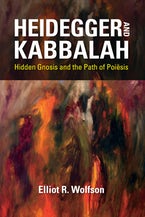Shaul Magid at Marginalia:
 There are relatively few books, and this is one, that could have only been written by one scholar, in this case Elliot Wolfson. Some scholars have the requisite understanding of Heidegger, and very few others, the requisite expertise in Kabbalah. But no one to my knowledge has both sufficient to create such a study. The distinctive nature of this combination raises the question: who is the audience for this book? The answer, I submit, must include that Wolfson wrote this book for himself; it is the culmination of decades of intense reflection on both Heidegger and Kabbalah. But more interestingly, and importantly, this is a book that will create its audience. It is more than a book about Heidegger and/or Kabbalah (others have written on, or noticed the affinity between, Heidegger and Judaism, including Altmann, Fackenheim, M. Wyschogrod, E. Wyschogrod, Scult). Wolfson’s book demonstrates how to think more broadly about each refracted through the lens of the other. It is not comparative in any conventional sense. Rather, it is a book that trains its reader along the way in how Wolfson wants us to read both Heidegger and Kabbalah, and to read and think with, through, and beyond, philosophical canons. Thus only after reading the book from beginning to end does one then understand what the book is about. There is no introductory guide to the argument or even the project. One jumps into a deep end that only gets deeper.
There are relatively few books, and this is one, that could have only been written by one scholar, in this case Elliot Wolfson. Some scholars have the requisite understanding of Heidegger, and very few others, the requisite expertise in Kabbalah. But no one to my knowledge has both sufficient to create such a study. The distinctive nature of this combination raises the question: who is the audience for this book? The answer, I submit, must include that Wolfson wrote this book for himself; it is the culmination of decades of intense reflection on both Heidegger and Kabbalah. But more interestingly, and importantly, this is a book that will create its audience. It is more than a book about Heidegger and/or Kabbalah (others have written on, or noticed the affinity between, Heidegger and Judaism, including Altmann, Fackenheim, M. Wyschogrod, E. Wyschogrod, Scult). Wolfson’s book demonstrates how to think more broadly about each refracted through the lens of the other. It is not comparative in any conventional sense. Rather, it is a book that trains its reader along the way in how Wolfson wants us to read both Heidegger and Kabbalah, and to read and think with, through, and beyond, philosophical canons. Thus only after reading the book from beginning to end does one then understand what the book is about. There is no introductory guide to the argument or even the project. One jumps into a deep end that only gets deeper.
more here.
